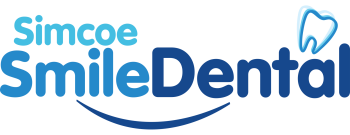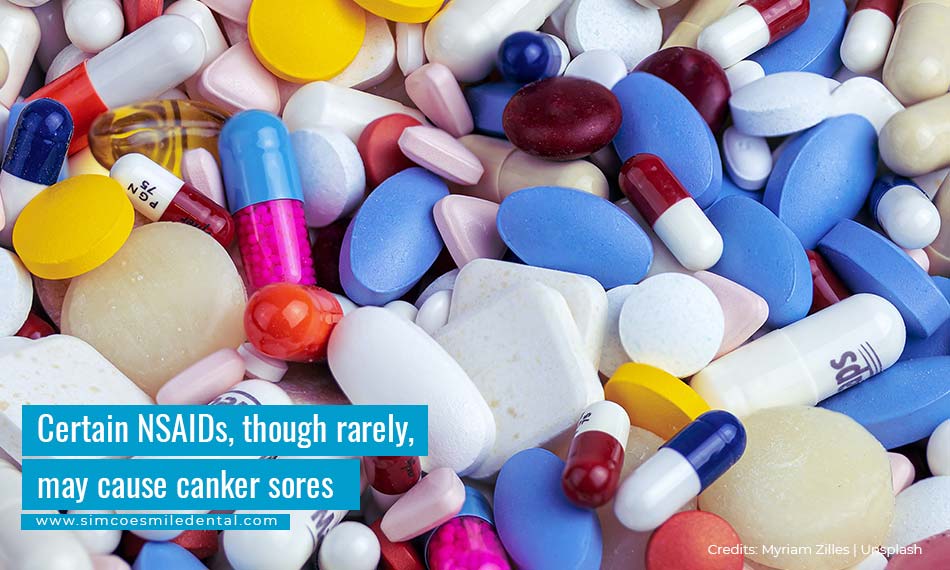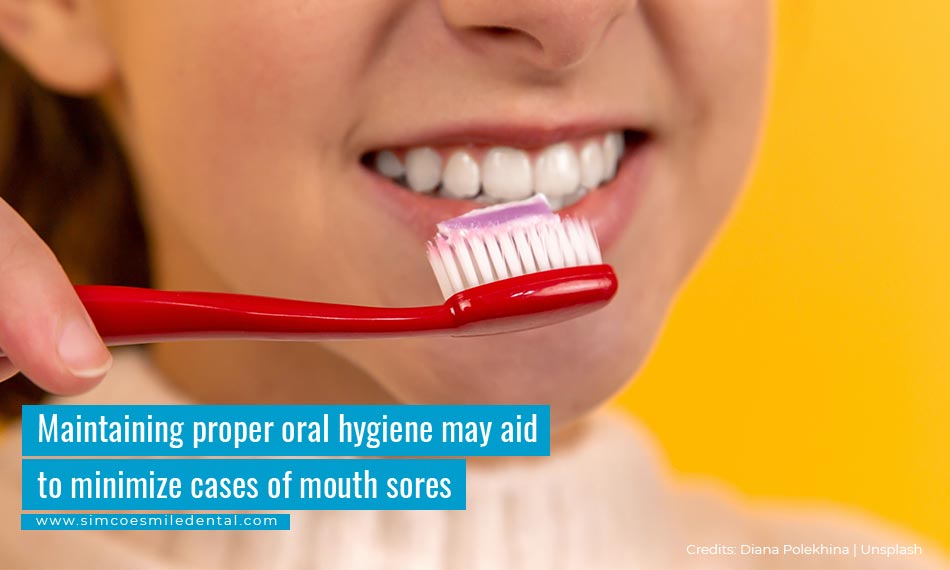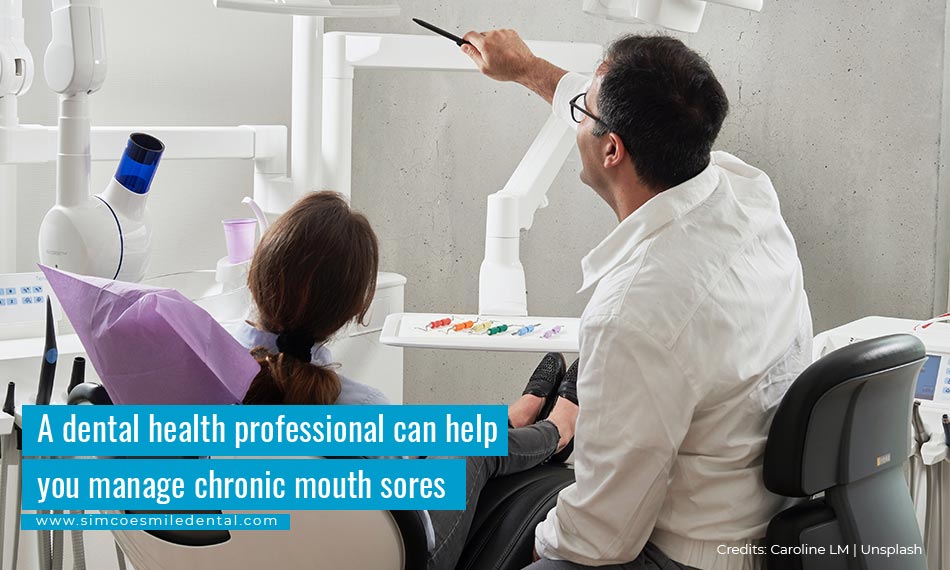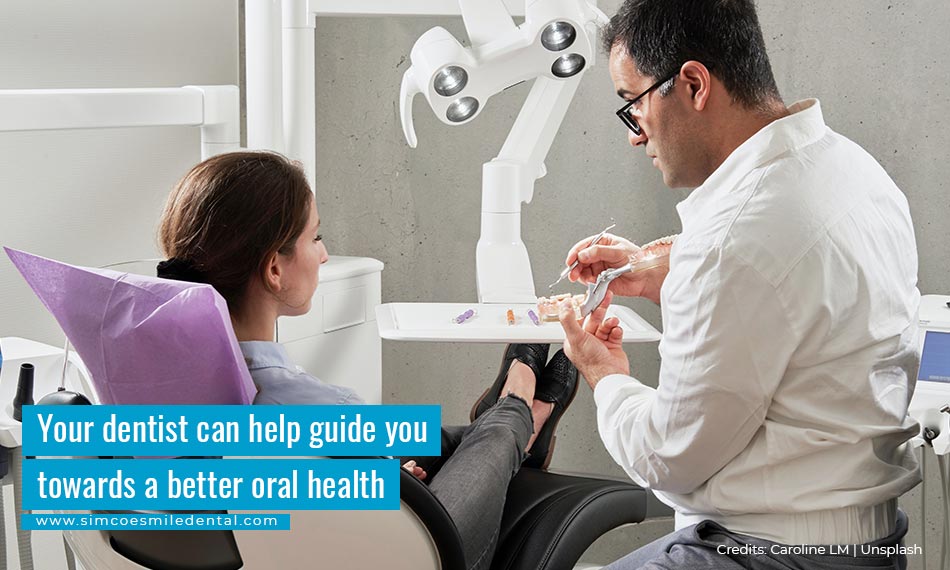Mouth sores can occur at many points of our lives. There are varying causes, symptoms, and severity. Although sores in the mouth are often mild, more serious and chronic conditions can be a symptom of deeper underlying issues. Some of these issues may go beyond the scope of dental health.
Here’s what you need to know about sores:
Types of Sores
- Canker Sores
Aphthous ulcers, also known as canker sores, are small, shallow lesions that appear on the soft tissues of the mouth or at the base of the gums. Canker sores, unlike cold sores, do not appear on the surface of your lips and are not communicable. However, they can be painful and make eating and speaking difficult.
Minor sores can often be caused by stress, soft tissue injuries from a sharp tooth or a dental tool. Acidic food such as fruits, and sodas can also contribute to the sores. Other causes can be non-steroidal anti-inflammatory drugs (NSAIDs) like ibuprofen and mefenamic acid, allergies to food, and H.r pylori, the bacteria that can cause peptic ulcers.
However, more complex sores can also occur and are usually a sign of deeper health issues. A weakened immune system due to illnesses such as HIV/AIDS and Lupus can compromise your body’s ability to fight off infections and can thus cause sores.
The pain from a canker sore normally goes away in a few days, and the sores heal on their own in about a week or two. Antibacterial mouthwash, topical steroids to control inflammation, and analgesics to relieve pain may be used to treat big, long-lasting, or exceptionally painful sores.
If you have canker sores that are unusually large or painful or don’t seem to heal, consult your doctor or dentist.
- Cold Sores
Cold sores and canker are not the same thing.
Cold sores are painful, fluid-filled blisters that are also known as fever blisters. Cold sores, unlike canker sores, are caused by a virus called herpes simplex virus type 1 (HSV) and are extremely contagious. Cold sores frequently form outside the mouth, under the nose, around the lips, or under the chin, whereas canker sores appear inside the mouth.
When you initially encounter cold sores, the symptoms are usually the most severe. A child’s first cold sore might make them very sick. Your body should produce antibodies after the initial outbreak, and you may never get another infection. However, many people get recurring cold sores.
The HSV virus is the most common cause of cold sores. When you come into contact with people or things that are infected with HSV, you contract it. It can be contracted by kissing someone infected with the virus or by exchanging eating utensils, towels, or razors.
Cold sores aren’t usually dangerous, but they can be life-threatening if you have a weak immune system, have a condition such as AIDS, or are taking medications that undermine your body’s immunity.
Cold sores do not have a cure at the moment. The virus will remain in your body once you’ve been infected. Antiviral medication can help with the healing of the sores, especially when you take them early on.
- Gingivostomatitis
Gingivostomatitis is an oral infection. Swelling of the mouth or gums is the most common symptom. There may also be mouth lesions that look like canker sores. It’s possible that this infection is caused by a virus or bacteria. It’s frequently linked to poor dental and oral health care, and the HSV-1 virus (the same virus that causes cold sores).
Children are more susceptible to gingivostomatitis. Because of the often severe discomfort produced by the sores, children with gingivostomatitis may drool and refuse to eat or drink. Fever and enlarged lymph nodes are other possible symptoms.
Without treatment, gingivostomatitis sores normally resolve in 2 to 3 weeks. If gingivostomatitis is caused by bacteria or a virus, your doctor may give an antibiotic and clean the infected region to aid healing. Pain medicines sold over-the-counter may also be beneficial. Even if it hurts, continue to brush your teeth and gums, albeit gently. Your symptoms may worsen if you do not continue to practice appropriate dental hygiene. You’ll also have a higher chance of getting gingivostomatitis again. Brushing your teeth gently with a soft toothbrush will help to ease symptoms.
- Oral Thrush
Oral candidiasis, often known as oral thrush, is a yeast or fungus infection of the genus Candida that affects the mouth’s mucous membranes.
Oral thrush is not a serious concern for the vast majority of people. People with a weaker immune system, on the other hand, may experience considerably more severe symptoms. The prognosis for oral thrush is generally favourable. The majority of patients respond favourably to treatment. Oral thrush, on the other hand, is prone to recurrence, especially if the underlying cause (for example, smoking) is not addressed
Anti-thrush medications, such as nystatin or miconazole, are commonly prescribed as drops, gels, or lozenges by doctors. Alternatively, a topical oral suspension that is rinsed around the mouth and subsequently ingested may be administered.
Patients with compromised immune systems may benefit from antifungals taken orally or intravenously. If treatment fails, amphotericin B may be administered; however, because of the undesirable side effects of fever, nausea, and vomiting, this will only be used as a last resort.
- Leukoplakia
Leukoplakia is a disorder in which the tongue and mucosa develop white spots or plaques. Leukoplakia is frequently caused by mouth irritants and factors such as smoking and soft tissue damage. Doctors can usually differentiate leukoplakia from other similar benign plaques and patches in the mouth by doing an exam.
Leukoplakia is considered a precancerous lesion. Doctors may request a biopsy to rule out cancer.
Leukoplakia is a condition that creates white plaques and patches on the mouth’s mucous membranes. A lesion may feature reddish discolouration speckles at times. Leukoplakia patches and plaques are frequently painless. People with an underlying illness, such as cancer, may, however, endure pain.
Many white patches in the mouth are nothing to be concerned about. Anyone who gets oral white plaques, on the other hand, should consult a doctor for a thorough examination. These plaques can occasionally be a sign of a more serious health problem, such as cancer, that requires medical attention.
Chronic irritation, such as that induced by smoking, appears to have a substantial role in the majority of patients with leukoplakia. Damage to the oral tissues appears to promote skin growth and thickness. The thickening could be due to hyperkeratosis (excessive thickening of the skin’s outer layer) or abnormal skin cells in the skin.
- Oral Lichen Planus
Lichen planus is a chronic skin condition that can affect the mouth and other parts of the body.
It’s known as ‘oral lichen planus’ when it appears in your mouth. It can occur on its own or as part of a larger illness that affects other sections of your body. Oral lichen planus is more common in women than in males, and it usually appears in middle age.
In most cases, the cause of lichen planus is unknown. It could be a symptom of a little deficiency in the body’s immunological (defense) system, however lichen planus sufferers rarely have other issues. A reaction to certain painkillers, diabetes treatments, high blood pressure medications, beta-blockers, gold, or penicillamine can occasionally cause it. Oral lichen planus isn’t caused by infection, and it doesn’t appear to run in families. Emotional stress, spicy foods, and citrus fruits can all aggravate the symptoms.
Oral lichen planus is usually only treated when it causes discomfort. Patients often report mild roughness of the mouth lining with white spots. However, in most cases, no treatment is required. When oral lichen planus requires treatment, a corticosteroid cream is applied to the affected area. Other treatments, such as immunosuppressants, may be required in some cases. You may occasionally need to take a corticosteroid or other comparable medicines.
Contact a Dental Health Professional
It is not advisable to treat these oral symptoms on your own as there may be other causes that need to be ruled out. It would be best to get a thorough consultation from a dental health professional.
Turn to Simcoe Smile Dental for a professional consultation. Our dental clinic in Oshawa is here to help you. Call us at 905-728-2321 or send us an email at smile@simcoesmiledental.com
